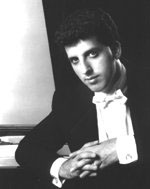 The career of pianist Jeffrey Biegel has been marked by bold, creative achievements and highlighted by a series of firsts. The career of pianist Jeffrey Biegel has been marked by bold, creative achievements and highlighted by a series of firsts.
He performed the first live internet recitals in New York and Amsterdam in 1997 and 1998, enabling him to be seen and heard by a global audience. In 1999, he assembled the largest consortium of orchestras (over 25), to celebrate the millennium with a new concerto composed for him by Ellen Taaffe Zwilich. The piece, entitled 'Millennium Fantasy for Piano and Orchestra', was premiered with the Cincinnati Symphony Orchestra. In 1997, he performed the World Premiere of the restored, original 1924 manuscript of George Gershwin's 'Rhapsody in Blue' with the Boston Pops. Charles Strouse composed a new work titled 'Concerto America' for Biegel, celebrating America and honoring the heroes and events of 9-11. Biegel premiered the piece with the Boston Pops in 2002. He transcribed the first edition of Balakirev's 'Islamey Fantasy' for piano and orchestra, which he premiered with the American Symphony Orchestra in 2001, and edited and recorded the first complete set of all '25 Preludes' by Cesar Cui.
Currently, he is assembling the first global consortium for the new 'Concerto no. 3 for Piano and Orchestra' being composed for him by Lowell Liebermann for 2005-06-07. The World Premiere will take place with the Milwaukee Symphony Orchestra, conducted by Andreas Delfs on May 12-14 2006, followed by the European Premiere with the Schleswig Holstein Symphony Orchestra, conducted by Gerard Oskamp, February 6-9, 2007.
Biegel is currently on the piano faculty at the Brooklyn Conservatory of Music at Brooklyn College, at the City University of New York (CUNY) and the Graduate Center of the City University of New York (CUNY).
|
|
|
|
|
|

Tuesday, November 21, 2006
When Liszt played for Beethoven
I was teaching Beethoven's mammoth 'Hammerklavier' Sonata today--that last movement fugue is incredibly difficult--pianistically challenging to say the least. My student, who has also brough Medtner's g minor Sonata and Copland's Piano Variations, was sharing how Egon Petri and Ernst Levy played the 'Hammerklavier'--names we almost never hear unfortunately--and when Beethoven heard a 13-year old Franz Liszt--can you imagine the young Liszt being presented to Beethoven? Perhaps Beethoven was my age when he heard Liszt. He asked Liszt to play a Bach fugue--and then transpose it! The great pianists since Beethoven, many of them played the 'Hammerklavier'--I asked my student why so many don't today--he said, 'It's too hard!' Well, it also seems hard to see major record labels lay-off top-tier administrators who have dedicated their lives to the industry--and it's all going digital download--yes, the world is evolving into a new industrial revolution in technology, and we have to adapt to the changes. But we must always remember the great artists and the vast repertoire they performed in recitals--we must keep recitals alive, otherwise, the repertoire will shrink enormously--yet, who can pen a work such as the 'Grosse Fugue' or 'Hammerklavier' sonata? It always amazes me to think about what it must have been like to be around amongst these giants of composition.
posted by Jeffrey Biegel
6:41 PM
|
| |



